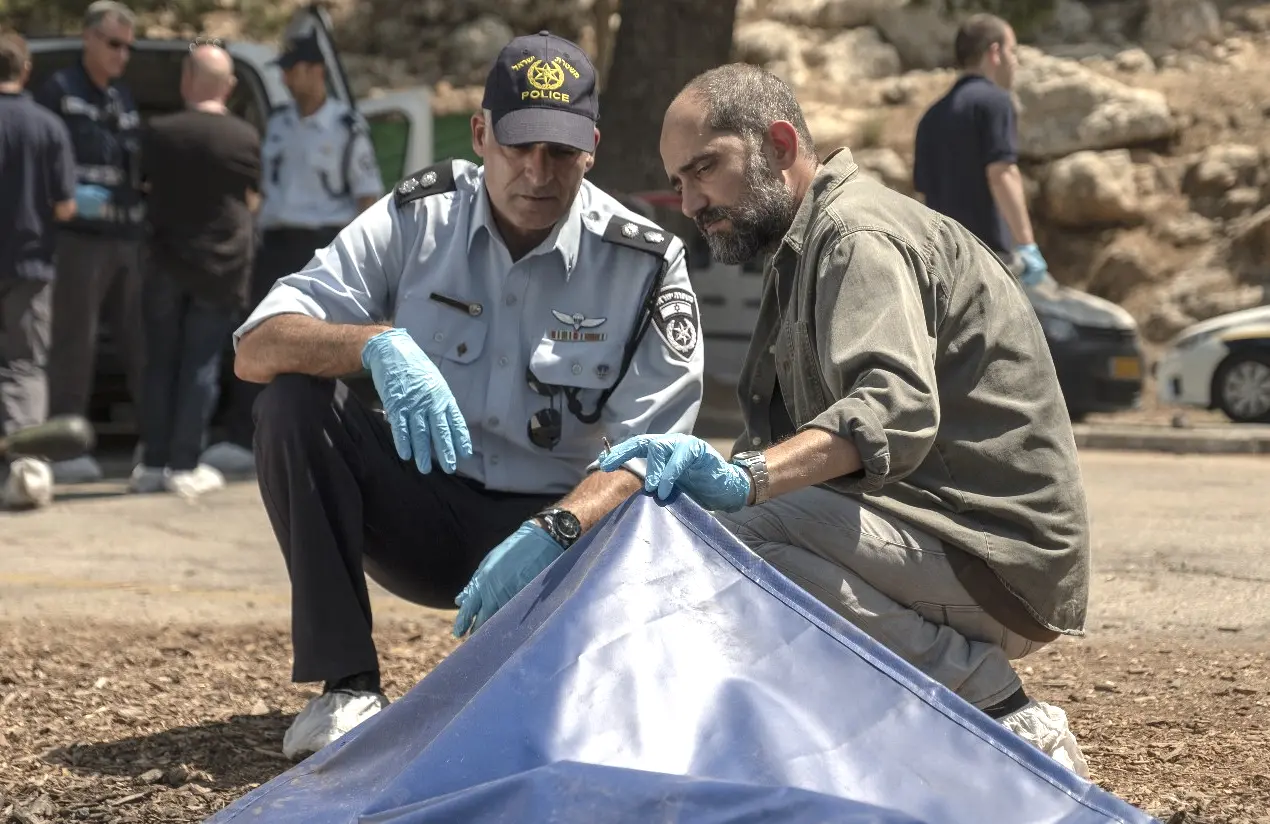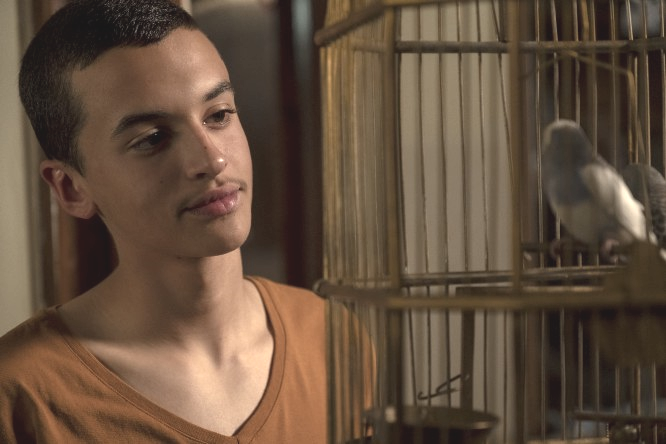In HBO's Our Boys, the Israeli-Palestinian Conflict is Turned Into a Crime Show
-
 Tzahi Grad and Shlomi Elkabetz play a police office and a counter-terrorism agent investigating the murder at the heart of Our Boys. (PHOTO: RAN MENDELSON/HBO
Tzahi Grad and Shlomi Elkabetz play a police office and a counter-terrorism agent investigating the murder at the heart of Our Boys. (PHOTO: RAN MENDELSON/HBOWhen three Israeli teenagers were kidnapped and murdered by Palestinians loyal to Hamas in the summer of 2014, the story made worldwide news. And that’s largely due to three words uttered by Israel’s prime minister: “Hamas will pay.” You don’t have to know anything about Gaza to know that very bad things were about to follow.
Shortly afterward, a 15-year-old Arab boy, Mohammed Hussein Abu Khdeir, was found burned and bludgeoned in a remote area outside Jerusalem. He was obviously the victim of a revenge killing, to which a group of ultra-orthodox Jews ultimately confessed. But the news did not command nearly the same amount of news coverage. That’s because by the time Mohammed’s body was found, Israel had begun retaliating. TV screens filled with images of the homes of suspected Hamas militants being bombed to bits. Numerous civilians died, including — inevitably — yet another 15-year-old boy, this one killed by a stray bullet fired during a raid by Israeli forces in the West Bank.
Our Boys, an absorbing 10-part Israeli-produced miniseries that begins tonight on HBO, is based on the events now referred to as the Israel-Gaza Conflict or 2014 Gaza war. The title is deceptive. It’s not really about Naftali Frenkel, Eyal Yifrach and Gilad Shaar, the three Israeli teens who went missing and were popularly referred to in the Israeli media as “our boys.”
This series, instead, is about the revenge killing of Mohammed Khdeir. Our Boys is a crime procedural, and a very deliberately-paced, some might say plodding, one at that. To give you some idea, by the end of the seventh episode (the last one furnished to me for viewing), only one of the suspects in Mohammed’s killing is even in police custody. This is unusually slow storytelling, even by slow-TV standards.

Not only is this the world’s pokiest procedural, and set in the always-confusing (to Americans) context of Arab-Israeli relations, but all the dialogue is in Hebrew and Arabic, with English subtitles. (HBO teamed with Keshet Studios before, on the adaptation of In Treatment a decade ago — but at least In Treatment was recast with English speakers and reshot from the original scripts.)
So that’s a hard ask for viewers — devote ten hours of their life to staring at subtitles. Why bother?
Well, despite the pacing, or maybe because of it, Our Boys is actually pretty engrossing. And it’s timely. The events depicted here are a microcosm of much that’s going wrong in the world these days — and not just in the Middle East. At the heart of Our Boys is a notion that political leaders lead with their words. Those words can urge calm and understanding, or they can fuel and legimitize hate and violence. So it’s not just about two historically combative groups halfway around the world. To quote Eddie Glaude, this is us, too.

There are essentially three stories being told here. One is of Mohammed’s family (Muslim), one is the extended family of Mohammed’s killers (Jewish), and one is of the official Israeli government investigation, led by an enigmatic and barely observant (in the religious sense) domestic-terrorism agent named Simon (Shlomi Elkabetz). Using a battery of surveillance cameras and microphones so intrusive that I felt like I was watching an old episode of 24, Simon eventually hones in on the young men who took it on themselves to avenge the killing of “our boys.”
One is an unhappy teenager named Avishai (Adam Gabay), whom Simon identifies as the suspect most likely to flip. A yeshiva dropout with the weight of family expectations on his shoulders, Avi turns out to be less like his relatives than his future victim Mohammed (Ram Masarweh), who is at loggerheads with his demanding father Hussein (Jony Arbid).
By slowing the pace of its narrative, Our Boys buys itself enough time to see these nuances in its main characters, a luxury you don’t get on a typical episode of SVU. And that allows us to see past our boys as more than just victims of crime. All of them are, to one degree or enough, caught up in a cycle of aggression fueled by outrage that is stoked by each side’s political leadership, not to mention plain old testosterone.
“Holding onto victimhood creates more aggression; examining your own aggression prevents the next victim,” said Joseph Cedar, one of the creators of Our Boys. “We’re not interested in our own victimhood, not because we don’t sympathize with the pain but because we have an interest in stopping the cycle.”
That would explain why Our Boys begins its story, not with the kidnapping of the three Jewish teens, but with the mass rallies that were held while the boys’ fate was still not known to the public. Israeli authorities had known for two weeks that the teenagers were dead, but critics say they encouraged the public to believe otherwise. Why? Because when hopes for the boys’ safe return were cruelly punctured, Israel’s government could launch a brutal retaliation against Hamas knowing it had the support of an outraged public.
But when our leaders seek to manipulate rather than lead, there can be unforeseen consequences, like the revenge killing that is at the heart of Our Boys. In the show’s innovatively-told seventh episode, Simon takes Avishai to each of the places where he and his co-conspirators went on the night of Mohammed’s murder, and we see him describe what happened interspersed with quick-cut flashbacks. We see the killers cruising for their victim while singing religious songs and reciting the scriptures that justify the act they are about to commit. They pass a large group of Arab teenagers, and someone calls them “terrorists.” When Avi objects, he’s put in his place: “They’re all terrorists! They’re trained to kill Jews from birth. Feeling sorry for them means you’re weak.”

The camera lingers on Avi’s emotionless expression, long enough for you to see the struggle inside. Finally, the day after, this tender young boy separates from the others and wanders out to where a deer is grazing in a field. An innocent deer. That’s when we see Avi’s eyes well up with tears.
Our Boys is about a single death in a monthlong orgy of violence that took thousands of civilian lives, nearly all of them Arabs. More than a crime show, this is a parable about the endlessly repeatable cycle of outrage and violence that has humans around the world in its grip right now. It’s an argument for breaking the cycle of violence not through diplomacy or sanctions or military strength, but by reaching vulnerable young people before they can be turned into carriers of the aggression virus. What’s disturbing is the idea that this virus is no longer spread just by ISIS or white-supremacy groups, but by our elected officials.
Aaron Barnhart has written about television since 1994, including 15 years as TV critic for the Kansas City Star.
TOPICS: Our Boys, HBO, Keshet Studios